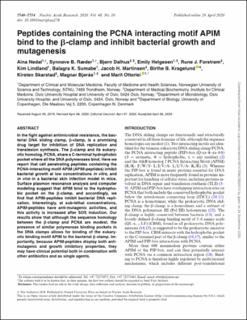Peptides containing the PCNA interacting motif APIM bind to the beta-clamp and inhibit bacterial growth and mutagenesis
Nedal, Aina; Ræder, Synnøve Brandt; Dalhus, Bjørn; Helgesen, Emily; Forstrøm, Rune Johansen; Lindland, Kim; Sumabe, Balagra Kasim; Martinsen, Jacob H.; Kragelund, Birthe B.; Skarstad, Kirsten Jane; Bjørås, Magnar; Otterlei, Marit
Journal article, Peer reviewed
Published version

View/
Date
2020Metadata
Show full item recordCollections
Abstract
In the fight against antimicrobial resistance, the bacterial DNA sliding clamp, β-clamp, is a promising drug target for inhibition of DNA replication and translesion synthesis. The β-clamp and its eukaryotic homolog, PCNA, share a C-terminal hydrophobic pocket where all the DNA polymerases bind. Here we report that cell penetrating peptides containing the PCNA-interacting motif APIM (APIM-peptides) inhibit bacterial growth at low concentrations in vitro, and in vivo in a bacterial skin infection model in mice. Surface plasmon resonance analysis and computer modeling suggest that APIM bind to the hydrophobic pocket on the β-clamp, and accordingly, we find that APIM-peptides inhibit bacterial DNA replication. Interestingly, at sub-lethal concentrations, APIM-peptides have anti-mutagenic activities, and this activity is increased after SOS induction. Our results show that although the sequence homology between the β-clamp and PCNA are modest, the presence of similar polymerase binding pockets in the DNA clamps allows for binding of the eukaryotic binding motif APIM to the bacterial β-clamp. Importantly, because APIM-peptides display both anti-mutagenic and growth inhibitory properties, they may have clinical potential both in combination with other antibiotics and as single agents.
